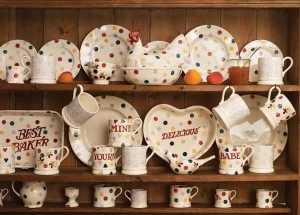
Britain’s celebrated pottery designer, Emma Bridgewater, has reported a near £1.4 million loss for her homewares brand, attributed to heavy discounting and increased competition online. This downturn follows a £1.1 million profit the previous year.
The Stoke-on-Trent-based company, founded by Bridgewater herself, experienced a 9% rise in sales to £36.2 million in the year ending May 2023, up from £33.1 million the previous year. However, this was insufficient to counterbalance a nearly 20% hike in production costs to £21 million and a 15% rise in staffing and administrative expenses to £16 million, pushing the business into the red.
The company faced fierce competition in the homewares market, leading to significant online price reductions during the peak summer season, which impacted sales growth. Additionally, surging raw material prices and higher energy costs required to maintain operations at its Stoke-on-Trent factory in Hanley further squeezed profits.
In response to the financial strain, the company has laid off dozens of staff from its 480-strong workforce. Last summer, 40 jobs were cut, and the factory adopted a four-day workweek for two and a half months. A further 36 positions were eliminated in February, accompanied by another two and a half months of reduced working hours for both part-time and full-time employees.
To mitigate future losses, Emma Bridgewater plans to review its pottery stock levels through 2025 to avoid substantial discounting.
Emma Bridgewater, alongside brands like Cath Kidston and Boden, has established a niche for quirky and colourful homewares. The brand is particularly renowned for its Royal-themed ceramics, with the then-Prince of Wales unveiling a plaque designed by Bridgewater during a 2017 visit to Stoke-on-Trent.
Founded in 1985, Bridgewater started by selling ceramics at a Covent Garden stall before expanding to luxury retailers such as Harrods and Selfridges. Together with her former husband, Matthew Rice, she acquired a Victorian-era pottery factory in Stoke in 1996, which has been pivotal to the company’s growth. Today, all ceramics are still produced at this facility, making it one of the largest pottery makers in the UK.
Despite the financial challenges, the brand maintains a devoted following, with approximately 30,000 visitors attending factory tours annually.
Read more:
Emma Bridgewater’s Pottery Empire Faces £1.4m Loss Amid Rising Costs




